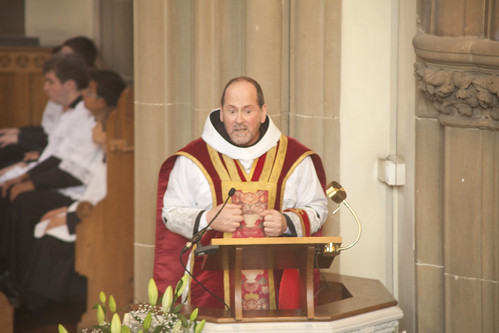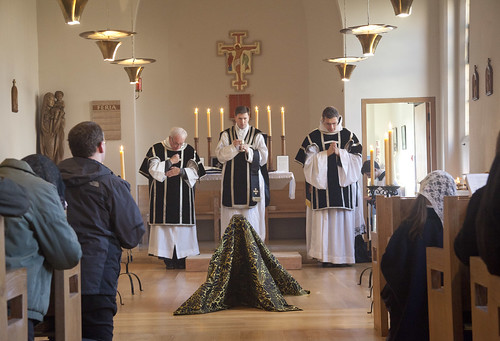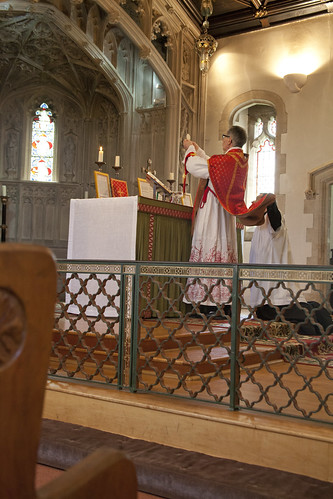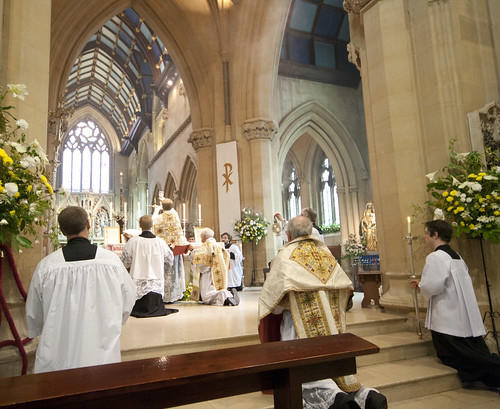 |
| Prior Mark Kirby of Silversteam, Ireland: not EBC, but a Benedictine taking the path of Tradition |
The Tablet called the meeting 'crisis talks'. 'Crisis' of course is an over-used word; properly, it suggests something dramatic which could end in more than one way: the crisis of a battle, or a crisis of health. What has been going on with the Benedictines for the last thirty or forty years is something not very dramatic, which is on the other hand pointing very firmly in the direction of one outcome. That outcome is the disappearance of the Benedictine vocation from this country.
 |
| A Traditional Requiem in a house belonging to Ampleforth Abbey. The celebrant is Fr Edward van der Burgh of the London Oratory; a young American monk (right) assists. |
 |
| Mass celebrated by an English Benedictine, though not EBC, in Prinknash Abbey |
On the matter of community, we noted how significant, though largely un-remarked, was fear in our communities: fear of future prospects, of change, of community failure to survive, fear of newer brethren and their different mindset. ...
Vocations made for a lively and rich discussion, and really an excellent one. The question was starkly posed: do our communities truly want vocations? Is it something they pay lip-service to without undertaking the necessary self-reflection, and even change, that growth in authentic vocations (ie, those who “truly seek God”) might require? ...
It is one thing to say things like this, or hear them said, and another to implement them effectively. It should be obvious to everyone not completely cocooned from reality that to get vocations today you need to be open to a rediscovery of Tradition, and the Benedictines have a lot of wonderful tradition to rediscover. That's not to say they've lost it all, but even in happier times an ancient way of religious life will have things in its tradition to rediscover and restore, which will fit it better for the challenges of the present day. The question for the Benedictines is whether they want to allow this natural process, which was actually called for by the Second Vatican Council, to take place, or whether they want to preserve the 1970s in aspic, close the doors, and die maintaining the perfect insights of that perfect decade, to the exclusion of all others.
 |
| A recently ordained secular priest, Fr Wisenant, celebrates High Mass in Belmont Abbey for the LMS Priest Training Conference 2014 |
If they choose the latter course, the light at the end of the tunnel will turn out to be the proverbial oncoming train.
I hope they listen to Vatican II's decree on the Religious Life, Perfectae caritatis 2: ‘let their founders’ spirit and special aims they set before them as well as their sound traditions—all of which make up the patrimony of each institute—be faithfully held in honour.'
Support the work of the LMS by becoming an 'Anniversary Supporter'.
A photo of the Rt Rev Dom Paul Stonham OSB, Abbot of Belmont Abbey, celebrating the LMS Holywell pilgrimage in 2014 would further exemplify the EBC being at ease with the Extraordinary From.
ReplyDeleteYes true, though I was looking for photos of the EF taking place in Benedictine churches, not of Benedictines saying the EF outside.
DeleteThis is very sad. The picture of the 30 monks in The Tablet must be of the General Chapter rather than the under 55s.
ReplyDeleteThe question that occurs to me is what exactly are the EBC for? What is their role? When I was a prep-school boy at Worth in the 1940s their role seemed very clear - passing on the faith to the next generation and to my mind they did it brilliantly and the liturgy was stunning. Can that be said of the schools they run to-day?
Hard to admit that your entire adult life has, in effect, been a mistaken and costly detour.
ReplyDeleteWhich is, I think, where our rhetoric is important.
DeleteOpposing the 1970s reforms as a mistake from the start and implying that they should never have been made and should be swept away (however true) will make it difficult for older 'church leaders' to accept change.
But talking of them as an idea of their time, which is now half a lifetime ago, from which it is now time to move on, may be more palatable. Dr Shaw's challenge about "preserv[ing] the 1970s in aspic" seems to be, I think, a good approach.